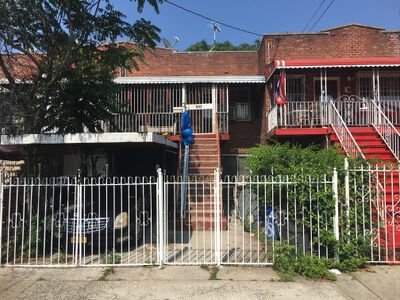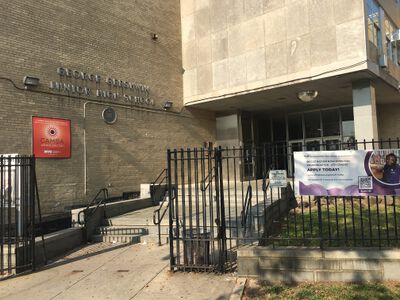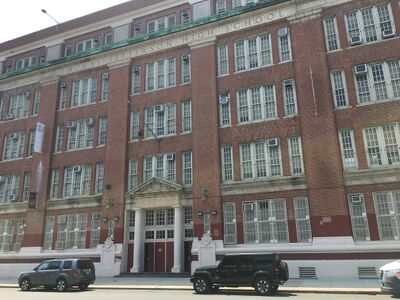Darren Robinson: Unterschied zwischen den Versionen
| Zeile 33: | Zeile 33: | ||
In spring of 1981, just one day after his family had moved to Schenk Avenue, Robinson met Damon Wimbley, who was playing football with his friend Jimmy next to Wimbley's house. | In spring of 1981, just one day after his family had moved to Schenk Avenue, Robinson met Damon Wimbley, who was playing football with his friend Jimmy next to Wimbley's house. | ||
Peter Shapiro states: "In 1983 they entered a rap contest at Radio City Music Hall and won first prize, a contract with Sutra Records, due in larger part to Buffy's beat-boxing skills, which he started doing in 1981 while in junior high." | Peter Shapiro states: "In 1983 they entered a rap contest at Radio City Music Hall and won first prize, a contract with Sutra Records, due in larger part to Buffy's beat-boxing skills, which he started doing in 1981 while in junior high." | ||
Version vom 14. Juli 2024, 23:15 Uhr
Darren Robinson (June 10, 1967 – December 10, 1995), also known as Big Buff, Buff Love, Buffy, The Human Beat Box, and DJ Doctor Nice, was a rapper, beatboxer, and actor, who was also member of the 1980s hip hop group The Fat Boys. He was the first person to perform the art of beatboxing and also call himself "human beat box".
Life and career
Early life
Darren Robinson was born in Manning, Clarendon County, South Carolina, on June 10, 1967. He was the third child of John and Ellaveen Robinson (*November 14, 1942) and had three siblings, his older brother Curtis, his sister Barbara and his younger sister Renee.[1]
When Robinson was still young his family moved to Sheffiled Avenue in New Lots, Brooklyn, where he also attended elementary school P.S. 190 Sheffield from 1973 to 1978.
In 1978 Robinson went to J.H.S. 166 George Gershwin on Van Sinclen Avenue until 1981.
In spring of 1981 his family moved to the same block on Schenck Avenue where his later band members Kool Rock Ski and Prince Markie Dee already lived with their families.
In 1981 Robinson attended Thomas Jefferson High School and along with Wimbley he joined the High School football team, but when Wimbley quit he also decided to focus on music.
https://youtu.be/XZQHXvxj-cw?t=246
When they became successful with their music they received private tutoring to get their diploma in favour of their musical career.
At the age of 20 Robinson's girl friend Lynise Walters (*September 24, 1972) known as Queen Pen gave birth to their son Quinton, who later became a rapper himself known as Q NHannaz.
In 1985 Robinson and his parents moved to Rosedale, Queens.
Robinson died in Rosedale, Queens County, New York on December 10, 1995 and was burried on the Amityville cemetary in Suffolk County (Long Island), 55 Harrison Ave, Amityville, NY 11701. Robinson's brother and later manager Curtis died in 2018.
Musical career
In spring of 1981, just one day after his family had moved to Schenk Avenue, Robinson met Damon Wimbley, who was playing football with his friend Jimmy next to Wimbley's house.
Peter Shapiro states: "In 1983 they entered a rap contest at Radio City Music Hall and won first prize, a contract with Sutra Records, due in larger part to Buffy's beat-boxing skills, which he started doing in 1981 while in junior high."
About a year later Robinson and Wimbley had their first public performance in front of a bigger audience in a talent show in the auditorium of Thomas Jefferson High School.
His group Disco 3 won a Tin Pan Apple rap contest in 1983 and went on a promotional tour for their first record.
The Fat Boys performed at the New York City Fresh Fest, also known as Fresh Fest '84 on July 28, 1984. This event was one of the first major hip-hop concerts and featured several pioneering artists in the genre.
Origin of beatboxing
According to his own statement in the The Morning Show hosted by Regis Philbin and Cyndy Garvey, which was aired on ABC7 in 1984, Robinson said that he started beatboxing seven years ago.
Whereas in the TV show Midday hosted by Bill Boggs, which was aired xxxxxxxxxx 1984, Robinson names an even earlier date. When asked by a girl from the audience, "Where did you [...] learn to make these sounds from?" Robinson answers, "[...] '75, yeah, you know I wanted a drumset, but you know I couldn't afford one at the time. So I just started listening to records and then I traced my beats off them."
In the documentary Breath Control (2002) by Joey Garfield his brother Curtis Robinson confirms the year 1977 as the starting point for Darren's beatboxing saying "when I first started hearing him play the beatbox he was maybe about 10 years old".
In the documentary "Beatboxing - The Fifth Element of Hip Hop" (2011) Curtis reveals more details of how Darren's beatboxing evolved. The New York City Blackout of 1977 was crucial for the genesis of beatboxing. Curtis had purchased a radio cassette recorder (model: Realistic SCR-10) from RadioShack at Pennsylvania Avenue before he went to summer camp out of town. He lent this boombox – or beatbox as it was also called in the area – to his younger brother Darren under the condition of not taking it off the porch. But on July 13th Darren ignored his brother's request and took the radio and went around the corner to impress some girls from the neighborhood. At about 9:37 p.m. all lights went out all over Brooklyn due to the big Blackout and Darren was so scared that he dropped the radio and ran home.
When his brother came back from summer camp, he asked him where his radio was. Darren was very nervous and anxious to tell the truth. But right after telling his brother, he offered him to play all songs he would like to hear by just imitating them with his mouth and then he started beatboxing.
Beatbox style
Buffy breathing, Buffy clapping
Legacy
Robinson invented beatboxing and added this art form as a fifth element to hip hop culture, which originally consisted of graffiti, DJing, breakdancing and rapping.
Nowadays Beatboxing is practiced and known in most countries still mesmerizing audiences all over the world.
Most a cappella groups that perform popsongs have a beatboxer to provide the rhythms.
https://www.nytimes.com/1995/12/13/arts/darren-robinson-fat-boys-rapper-28.html
https://web.archive.org/web/20121105135546/http://www.highbeam.com/doc/1G1-17817811.html
https://apnews.com/article/65b104ed12fa84f85488bcdbdf6c36b5
https://de.findagrave.com/memorial/19799/darren-robinson#source



